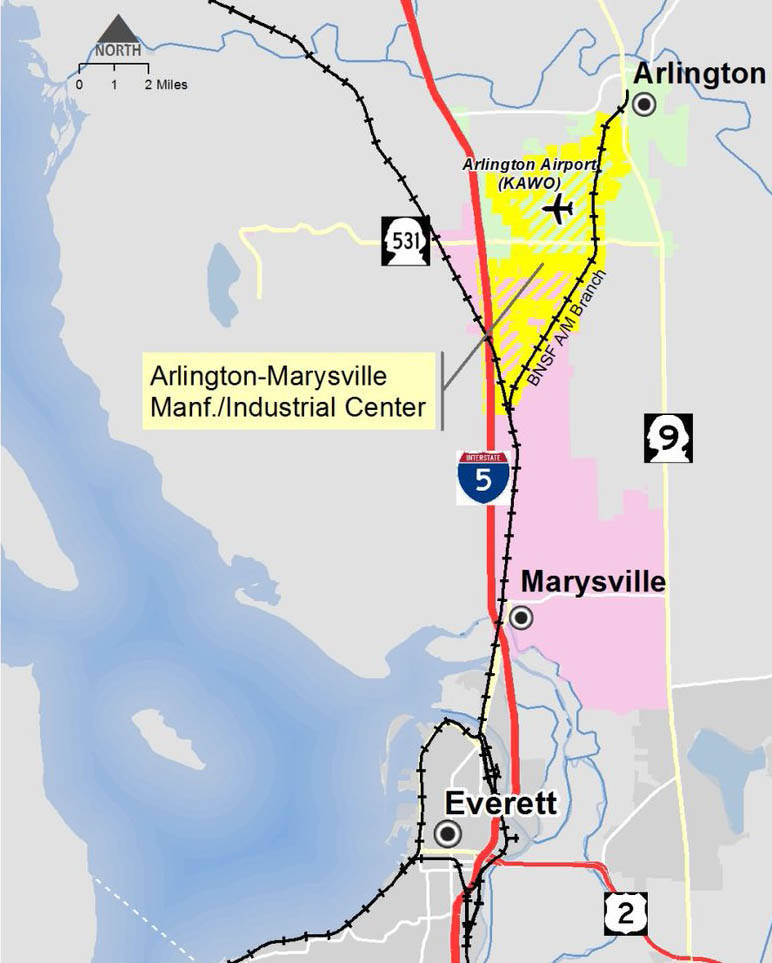The waiting game continues…
Marysville and Arlington leaders hoped for a positive for Thursday on the proposed Arlington-Marysville Manufacturing-Industrial Center.
But the vote of the Puget Sound Regional Council’s Growth Management Policy Board was delayed until January. The board wanted more time to review policy framework guidelines that relate to MICs; countywide centers in Snohomish, King, Pierce and Kitsap counties; regionally designated mixed use centers; and military installations.
Pending approval, the MIC decision would move on to the PSRC Executive Board for action later in the month, starting the clock where the cities could actually apply for MIC designation, a process that could last into summer.
The designation is important in bringing in corporations that pay higher wages than service-sector jobs, and you don’t need a college degree.
For local leaders who have worked together with Snohomish County to create a diversified manufacturing, industrial and advanced technologies center clustered around Arlington Airport and the Smokey Point area, a “yes” vote would have made a great early Christmas present.
However, waiting a little longer won’t slow the zeal that the cities have.
“I’ve got my hopes up that we’ll get to the vote next month,” said Arlington council member Jan Schuette, who serves on the policy board and has tracked the MIC’s progress over the past few years.
The Arlington-Marysville MIC spans about 4,000 acres, fairly evenly split between the cities, with a little more on the Arlington side. More than 1,700 of those acres are considered ready to develop because they are vacant, could be redeveloped or are only partly occupied, city officials said. Currently, there are about 5,300 jobs in the center, but it could become home to between 10,000 and 25,000 jobs by 2040. The MIC would become only the county’s second such center.
The state legislature gave Marysville and Arlington a tax break to help draw businesses to the area. The cities can exempt companies from paying a portion of property taxes if they create at least 25 jobs that pay at least $18 an hour. The cities in September were awarded infrastructure planning state grants focused on the future MIC. Meantime, Comcast is installing more robust fiber to serve the area, and the county PUD is upgrading substations to boost capacity.
PSRC senior planner Liz Underwood-Bultmann explained why the MIC designation is important.
“For cities, it’s an incentive,” she said. “MIC designation brings prioritization for transportation funding, and gives cities a leg up on regional funding to help with infrastructure needs that support manufacturing and industry activity.”
She added, “It raises the profile of the area, and provides regional status for marketing purposes.”
The Arlington-Marysville proposal is one of two new MICs – the South Tacoma Industrial Area is the other.
In all, the four-county region has 29 regional growth centers and nine designated regional MICs where intensive industrial and commercial activity dominates, or is planned.
The only MIC so far in the county is at Paine Field/Boeing in Everett. The center, designated in 2002, comprises 4,241 acres and total employment of 42,412 people.
A closer comparison to the proposed one here is the Sumner-Pacific MIC in Pierce County that gained its status in April 2016. It was the last center granted such by PSRC in the past decade. They share similar characteristics in zoning, buildable lands, environmental conditions, industry mix and economy, public services, access to rail, highways and ports, and traffic challenges. Sumner is a distribution warehouse paradise served by three freeways, Sounder commuter service and located between the ports of Seattle and Tacoma.
Sumner-Pacific’s MIC is a 2,100-acre industrial area in the two cities with more than 14,000 regional jobs. Key businesses include distribution centers for Amazon, REI and Costco, Keurig Green Mountain Coffee Roasters and aerospace concerns. Sumner landed Cummins after the engine manufacturer chose to build anew instead of remodel its Renton facility.
Sumner gained through MIC status what local cities are after.
“We gained priority for transportation grants to address our own issues revolving around truck routes and commuter traffic. It’s a nightmare, and we got more status to better tell the story of who we are,” Sumner spokeswoman Carmen Palmer said.



